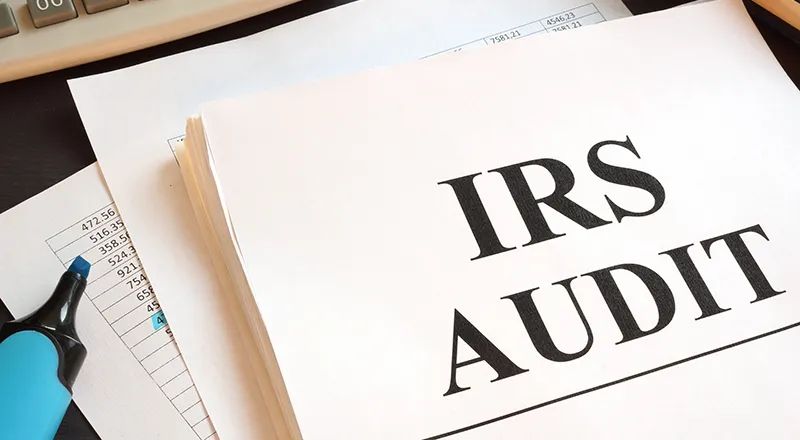According to current IRS rules:
Personal tax filing deadline
April 18, 2023
April 18, 2023
Filing time:
It starts on January 23, 2023
HHL lead
The New Year’s tax season began again, if the tax is not correct, light is to pay tax fines, heavy may cause a lawsuit.
This period, Junheng accounting firm will analyze with you, the IRS is how to choose the object of tax inspection, and which taxpayers are more likely to be investigated?

Random selection and computer filtering
Common computer identification programs used by the IRS include: Discriminant function system, DIF (Discriminant Function System), Document Perfection Program, Information Matching Program, And Special Audit Programs.
In short, the Internal Revenue Service (IRS) uses a series of computer programs and outside sources of information to identify taxpayers suspected of tax evasion.
Correlation examination
The IRS may select your tax form for audit if it relates to or deals with other taxpayers selected for audit, such as business partners or investors.
2. How many situations are easy to trigger tax inspection?
 Here are a few things that could trigger an IRS investigation:
Here are a few things that could trigger an IRS investigation:
One: is the individual tax declaration and submitted to the IRS report comparison
Therefore, all income must be reported truthfully and fully. Try not to misreport or omit income, and do not estimate or fabricate it casually.
If you file a conflicting Filing Status or Dependent file with someone else’s tax form, it will trigger an IRS review.
For example, when a couple divorces, they both claim their children as dependents, or they claim their adult children and their elderly parents as dependents, but they both file their taxes separately.
When the IRS automated screening system checks and finds that you didn’t report the relevant income, or that the amount is wrong, or that the information is wrong, it triggers the process.
Correct practice
If we find W-2, 1099
Or have errors in basic information,
In addition to notifying the other party of the change,
Also make sure to update the data to the IRS.
2: It is the average comparison between the personal tax declaration and other similar individuals
The self-employed can enjoy many tax deductions that ordinary employees cannot. For example, Home Office Deduction, travel miles related to business, travel, dining and even entertainment can be deducted as business expenses to reduce self-employment income.
For example, it’s normal for artists to report paintbrushes and the like as business expenses, but if you’re a lawyer who likes to paint, you can’t report paintbrushes and paints as business expenses.
It’s also not okay to claim 100 percent of your expenses as business expenses if you have only one car.
If your business expenses are 20% higher than those of other self-employed people of the same type (according to the occupation code on the tax form), the IRS will also be suspicious.
Another example is the taxi driver. If other drivers in the area have a net income of $40,000 to $50,000 after deducting various expenses, but you only have a net income of $10,000 after a total income of $100,000 for the low-income tax refund and medical insurance, you may be investigated.
Correct practice
Will be used for both commercial and personal purposes
Spending records are completely separate,
Keep detailed records of every business purchase
Location, distance, time,
Who is the purpose, who is the client,
And leave all relevant receipts of consumption.
If the IRS finds that your standard of living does not match your reported income, it will look for taxes.
For example, if a person reports a low income of $10,000, but the bank reports to the IRS that you pay a mortgage interest of $20,000 to the bank, you should not be able to apply for such a large loan based on your reported income;
Another person who has had a low income over the years, but has been able to buy multiple properties in cash, may be subject to a tax inspection.
If you choose to itemize deductions and your expenses are significantly higher than the average person, you could become a target for the IRS. Donations are tax-deductible, and in general, those earning between $100,000 and $200,000 a year reported an average donation of $4,188. If your AGI is $150,000, you might have no problem reporting a $5,000 contribution, but reporting a $50,000 contribution would raise red flags with the IRS.
Another example is a project that goes beyond the role of the taxpayer. For example, a plumber who declared some expenses related to the aircraft business would be treated with suspicion.
Another example is using numbered declarations. For example, $5,000 for advertising, $2,000 for transportation, and $1,500 for insurance. The IRS thinks you just made an estimate or a false statement and have no receipt records to back it up. Such a filing would only be subject to scrutiny by the IRS.
Declare all income truthfully
People earning more than $1 million are more likely to be taxed than the general population.
Because their taxes are higher, they are more likely to use complex measures to reduce their tax burden (which inevitably includes some illegal deductions). In the spirit of “casting a wide net to catch the big fish,” the IRS typically focuses its resources on these high-income individuals.
Failure to report foreign income may violate tax laws. Note that in addition to reporting your global income, you must also report any foreign bank or investment accounts on your U.S. tax form.
If the IRS finds that you have unreported income or unreported foreign financial accounts, you could face not only additional back taxes, but potentially steep penalties/interest and even jail time.
Declare all income truthfully

The IRS tries to audit tax returns as soon as possible after they are filed, so most audits will be on returns filed within the last two years. If the audit fails to close the case, the IRS may ask for an extension of the retroactive period of the assessment.
But if you underreport your income by 25 percent or more, the audit’s validity extends to six years. If you file a fraudulent tax return, there is no deadline.





